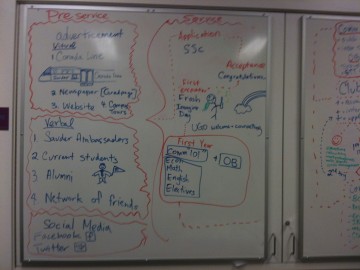Working in a team is like a box of chocolates- you never know who you’re going to get, but each one is filled with goodness inside.
My team- Team Van Houtte- is full of exceptional individuals. I’m pretty sure that each of us could probably do this project alone, but it would not be the same, and it would not be as good. We all come from different backgrounds, and it is the collaboration of these different minds that produce new and better creative results.
We’re lucky that at Sauder, most of our work is done in teams. I say we are lucky because in the “real world”, team work is an inevitable part of life, so it is good that we are getting plenty experience now. Working in teams can be a very rewarding experience. I have been fortunate enough that all of my team experiences at Sauder have been positive ones. I am a perfectionist though, and being a perfectionist comes with its share of difficulties when it comes to teamwork. A perfectionist will always want to be the last to look over the project, and be unwilling to share the workload because she feels unsure that her teammates can deliver. One very important thing that I have learned through working in teams is to put trust in others.
Without trust, the team environment can be toxic. Over the years, I have been able to trust and rely on my team members to execute on important responsibilities. This is true of group project teams and especially of teams within organizations. Of course, a person’s character matters a lot: the individuals on my teams have been highly capable people with a strong sense of responsibility, so the outcomes have always been good.
In order to create a thriving environment for everyone on a team, it is very important to keep in mind a few things:
- Be open to different opinions and perspectives – other people can bring immense value to the table and bring up ideas that you did not think of before, so be open to different points of view.
- Be honest to your team members to establish accountability with one another. If there are conflicts, do not engage in passive aggressiveness, but be honest about your thoughts and feelings.
- Be assertive and make your voice heard. This is also how your team members will come to respect you and value your input.
- Be a leader—regardless of your role within the team, it is important to be a leader and take owners hip of your own ideas or your responsibilities. Use the intellectual manpower available to you and lead your team members to a common goal.
- Be humble because nobody likes a show-off. Humility goes a long way in a team environment.
Working in a team is not easy, especially when conflicts arise. However, when trust, accountability, positive relationships, and comraand abundant creative juices are there, teamwork is especially enjoyable and rewarding. Yay for teams!
